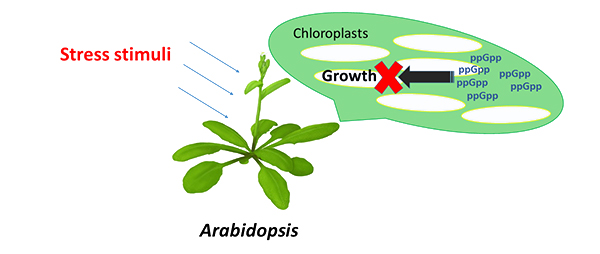Cultivating a new crop of superplants--a lesson from the fittest
Published: February 2, 2016
Tokyo Tech researchers shed light on how plants survived in the face of stress.
All cells have a series of biological responses to environmental stresses such as extreme heat or starvation. Interestingly, although the regulatory molecule for this response was first identified in bacteria, the same molecule has also been found in plant cells. This molecule, called ppGpp, controls cell functions to allow the organism a higher chance of surviving the stress. However, the role of ppGpp in the stress response of plants has remained unclear—until now.
Gaining insights through a transgenic plant
A team led by Associate Professor Shinji Masuda at Tokyo Tech has successfully isolated a ppGpp-overproducing mutant of Arabidopsis, an edible plant related to cabbage and mustard. Using this mutant, the group investigated the function of ppGpp—in particular how ppGpp controls metabolism and growth in times of stress.
ppGpp restricts growth during starvation
Under nutrient-limited conditions, the ppGpp mutants had stunted chloroplasts, the cell components responsible for converting light energy into sugars. Notably, the leaves were pale green with less chlorophyll. They also had lower protein and lipid levels and reduced photosynthetic activity. These findings indicate that ppGpp limits the use of energy by the plant cells—energy that would otherwise have been exhausted for immediate growth—to compensate for the stress.
Figure.
In a nutrient-deficient transgenic Arabidopsis plant, chloroplast development and function were found to be restricted by an increase in ppGpp—an important regulatory molecule in this molecular response.
Important implications for crop production
Masuda's team has demonstrated that the control of chloroplast development and function by ppGpp is one of the most crucial events in the response to environmental stress. Their findings also suggest that elevated levels of ppGpp are necessary for survival in the face of adversity. Further investigation of how ppGpp controls metabolism in plants will no doubt bring the reality of genetically engineered "superplants"—plants that are both tenacious and high-yielding—one step closer.
Reference
Authors: |
Mikika Maekawa1, Rina Honoki1, Yuta Ihara1, Ryoichi Sato1, Akira Oikawa2&3, Yuri Kanno3, Hiroyuki Ohta1&4, Mitsunori Seo3, Kazuki Saito3&5 and Shinji Masuda4&6 |
Affiliations: |
1Graduate School of Bioscience & Biotechnology, Tokyo Tech, 2Faculty of Agriculture, Yamagata University, 3Center for Sustainable Resource Science, RIKEN, 4ELSI, Tokyo Tech, 5Graduate School of Pharmaceutical Sciences,Chiba University, 6Center for Biological Resources and Informatics, Tokyo Tech |
Title of original paper: |
Impact of the plastidial stringent response in plant growth and stress responses |
Journal: |
Nature Plants |
DOI : |
|
. Any information published on this site will be valid in relation to Science Tokyo.



